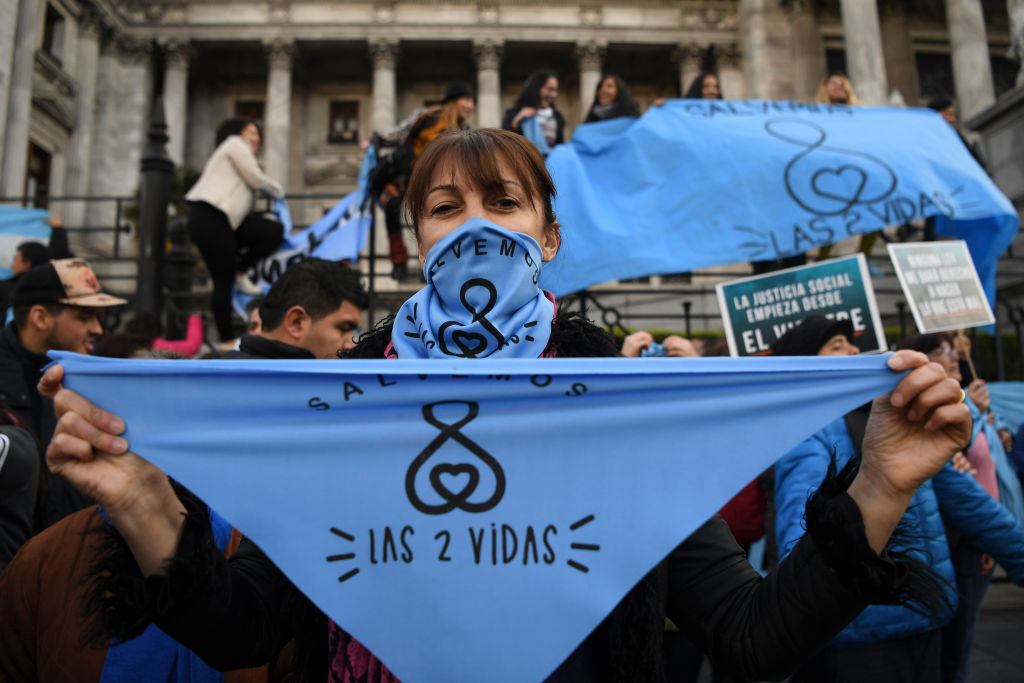Mothers from the slums of Argentina have asked Pope Francis to be their voice in the ongoing debate to legalize abortion in the Pope’s home country. According to Crux, the Argentinian women sent a letter to the Pope asking for his help because they feel like “prisoners” as the government and abortion advocates are telling them that they do not have the right to have children.
Argentina President Alberto Fernández is strongly promoting the idea of decriminalizing abortion through 14 weeks of pregnancy for girls as young as 13 by the end of 2020. The women who wrote to Pope Francis feel that the legalization of abortion will lead to pressure for them and their daughters to abort.
A similar debate regarding abortion for low-income women is currently being carried out in the United States. But in both countries, underprivileged women say that they do not want or need abortion.
Argentina
“We write to your Holiness, with the desire to ask for you to help us express to public opinion that we feel prisoners in a situation where our own family is compromised, as are our teenage daughters and future generations, that grow old with the idea that our life is not wanted and that we don’t have a right to have children because we are poor,” the women wrote on November 18 (emphasis original). They say that abortion advocates in Argentina are targeting poor women for abortion.
“We have been living this new stereotype every day since 2018 in the medical assistance centers installed in our neighborhoods,” the women wrote, saying that in these new clinics they are told, “‘How are you going to raise another child? In your situation it’s irresponsible to bring another child into the world’ or ‘abortion is a right, no one can force you to be a mother.'”
This lends credence to the idea that abortion is often not about “choice” but about coercion. These women do not want abortion, yet they are being told they need it.
“Our voice, like that of unborn children, is never heard,” they wrote. “They classified us as a ‘factory of the poor’; ‘workers of the State’. Our reality as women who overcome life’s challenges with our children, is overshadowed [by women who claim to] represent us without us giving our consent, stifling our true positions on the right to life. They do not want to listen to us, neither the legislators nor the journalists. If we did not have the slum priests who raise their voices for us, we would be even more alone.”
READ: Argentina’s health minister says preborn babies are a ‘phenomenon,’ not a human life
United States
In the U.S., similar “health clinics” are heavily concentrated in urban areas that are considered low income. According a recent report, Planned Parenthood puts 86% of its abortion facilities in these neighborhoods. Now, abortion advocates are pushing for the U.S. government to actually pay for the abortions of low-income women, putting even more pressure on these women to abort.
On December 8, a Congressional hearing, “The Impact on Women Seeking an Abortion but are Denied Because of Inability to Pay,” is scheduled. It will focus on the Hyde Amendment, which for nearly five decades has prevented the federal Medicaid program from paying for abortions. While Planned Parenthood touts itself as the home of health care (and abortion) for low-income women, its business model is structured around making money from abortion. Since abortion is expensive, if the government (taxpayers) pays for abortion through Medicaid, more low-income women will feel pressured to choose abortion when faced with the option of a “free” abortion. Women of low income may feel they have no other choice.
“[The Hyde Amendment] may be the pro-life movement’s single greatest achievement,” said Kelsey Hazzard, founder and president of Secular Pro-life, during a recent event promoting the importance of the Hyde Amendment. “[…] The Hyde Amendment matters both because it saves lives and because it sends a message about our national values. It says we don’t believe people are better off dead than poor. It says we don’t believe Medicaid kids should be targeted for destruction. And it says we won’t force people of conscience to be complicit in killing children in the womb just by paying their taxes.”
Low-income women in the U.S., just as in Argentina, do not want government-funded abortion. A 2017 Marist poll found that Americans with lower incomes were less likely than those with higher incomes to support federal and state funding of abortions through Medicaid. And a Harvard poll found that support for Medicaid funding of abortion is nearly twice as high among voters who make more than $75,000 a year as those who earn $25,000 or less. This disparity smacks of discrimination and eugenics in the promotion of government-funded abortion.
Valeria Lopez told Secular Pro-Life she was just 20 years old and in college when she learned she was pregnant. Three years later, she had a second son. Medicaid allowed her to be able to choose life both times as she wanted to. “My kids have no less value than anybody else born through different types of insurance,” she said. “I was able to have them because of Medicaid.” She believes many women may be tempted towards abortion if it were available through Medicaid.
In both the U.S. and Argentina, underprivileged women are fighting for the right of their children to exist while abortion advocates continue to tell them they would be better off with abortion.
“Like” Live Action News on Facebook for more pro-life news and commentary!







